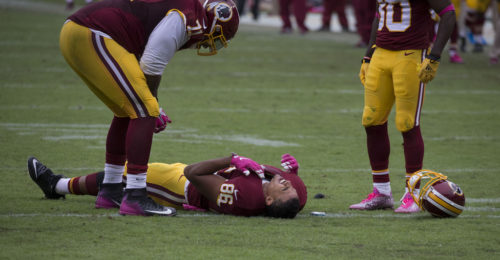Any parent who saw the movie Concussion, starring Will Smith, may be having second thoughts about putting their children into football, rugby or even participating in the contact sports themselves.
Concussion, as stated on the Sony Pictures website, www.sonypictures.com, is “the incredible David vs. Goliath story of American immigrant Dr. Bennet Omalu, the brilliant forensic neuropathologist who made the first discovery of CTE or chronic traumatic encephalopathy, a football-related brain trauma, in a pro player, and fought for the truth to be known. Omalu’s emotional quest puts him at dangerous odds with one of the most powerful institutions in the world.” Written and directed by Peter Landesman, Concussion was based on the GQ article Game Brain by Jeanne Marie Laskas. Ridley Scott was one of the show’s producers.
Concussion helped to open the dialogue on the seriousness of brain damage or injury in professional as well as non-professional sports.
Football is not the only sport we should point a finger at in terms on inherent danger for serious injury; count rugby, soccer, hockey, skiing, snowboarding and diving, amongst others. Any time a person is vulnerable to a serious hit to the head, either by hitting another player, the pavement or hard ground, a wall, rock or obstacle, a concussion or brain injury may be the result.
A brain injury can be life-altering, changing the person’s personality and their abilities to do even the simplest of tasks, depending on the extent of the injury.
There are different types of brain injuries such as focal damage, diffused damage, penetrating injury or closed wounds, and even ranges within each category. The damage suffered in an acquired brain injury commonly fits into the focal or diffuse category. Focal is a localized area of trauma usually caused by an object hitting the head. Diffuse damage, caused by diffuse axonal shearing injury which spreads over a wide area, impacting different regions of the brain. The result is that several brain functions may be negatively impacted, making the diagnosis difficult. Neuro-radiologists use MRI and other diagnostic imaging tools to identify brain damage, which is crucial information to assist the rehabilitation team in designing a program to suit the needs of the patient.
Brain injuries are also categorized by specialists in terms of the type of trauma, such as open or penetrating injury, whereby an object has entered the brain from the outside and leaves a visible source of trauma evident. A closed injury is when the object does not enter the brain, but causes brain injury and damage. Brain injuries suffered as the result of a car accident are often diffuse injuries, caused by sharp, violent jarring movements that may result in whiplash or even cause the brain to jar inside the skull.
Medical specialists use what is called The Glasgow Coma Scale, which helps determine the severity of brain injury suffered. Whether in sport or as a result of a car or motorcycle accident, emergency response workers often use The Glasgow Coma Scale as an initial diagnostic tool of a victim’s head injury. The scale examines three main areas to gauge the level of consciousness, including motor response to verbal commands, verbal response and the level of coherence in their speech and opening eyes on command.
New guidelines are in place for diagnosing mild traumatic brain injury. Those who have suffered from a concussion often experience ongoing symptoms long after the concussion occurred. In 2011, the Ontario Neurotrauma Foundation (ONF) released a standardized framework called Guidelines for Mild Traumatic Brain Injury (MTBI). Lingering symptoms can include dizziness, fatigue, difficulties with memory or intellectual tasks, and other symptoms. According to the new guideline, if the MTBI symptoms persist after a three month period, which is considered the normal recovery time, the injured party may be dealing with post-concussion syndrome. As a result, the person may have difficulty returning to work or even performing daily tasks, requiring ongoing medical and financial aid.
The movie Concussion put brain injuries back on our radar. If you have suffered a concussion, Horowitz Injury Law has the experience to ensure your true story gets all the attention it deserves. Each and every brain injury is different, and therefore, complex to diagnose and litigate, requiring the strong legal representation of Horowitz Injury Law, with almost 35 years of successfully handling cases involving concussions, catastrophic brain injuries, motor vehicle accidents and sports-related injuries. Call us today at 416-925-4100 or go online at www.horowitzinjurylaw.com to book a free consultation.




